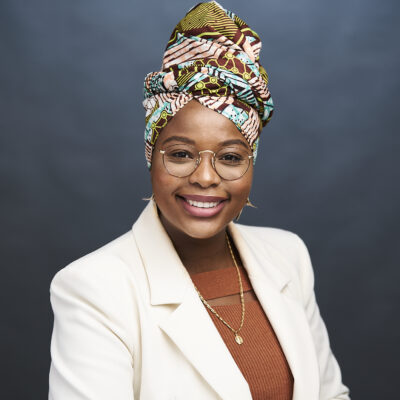Student Spotlight: Cátia Dombaxe

April 29, 2024
Cátia Dombaxe is a doctoral candidate in biomedical engineering from Luanda, Angola. She earned her B.S. in chemistry with a concentration in forensic sciences from Methodist University in North Carolina and an I.B. from the United World College Maastricht, Netherlands, and now studies molecular mechanisms associated with spinal cord regeneration under the guidance of Yadong Wang at Cornell.
What is your area of research and why is it important?
Central nervous system (CNS) injuries such as spinal cord injury (SCI) are highly devastating to the world population, affecting millions of people worldwide every year. Mammals do not regenerate their CNS; however, goldfish have the capability of regenerating their spinal cord after an injury. My research is uncovering molecular mechanisms associated with regeneration using proteins found in the extracellular matrix (ECM) of goldfish. We will use this new injectable therapy to assess its potential to induce neuron regeneration and functional recovery after SCI in mammals.
What are the larger implications of this research?
SCI is a devastating medical problem. SCI affects approximately 500,000 individuals worldwide annually with 18,000 of these cases in the U.S. alone. SCI causes severe physical damage and substantial psychological, social, and financial distress to those affected. Currently, there is no effective treatment for people suffering from SCI, and consequently, there is an urgent need to continue to develop new therapies. I hypothesize that using a nature inspired treatment will provide an understanding of goldfish SC regeneration and how I could use this biological mechanism for the development of therapies that would be effective in mammals.
You were recently onboarded with the National Geographic Society as a NatGeo Explorer. What does this mean to you?
During my time at Cornell, a critical goal of mine is to begin paying my success forward to support the next generation of young women scientists. Becoming a NatGeo Explorer means being able to propel my vision into reality more expeditiously than I would be able to on my own. The project funded through the National Geographic grant, Comunidade Ubunye, is focused on capacity building and providing access to hands-on STEM education to underserved communities with the ultimate goal of creating an exchange program to promote cultural understanding, build international cooperation, and provide access to high-quality education that will connect Cornell University students and faculty to Angolan universities.
What will being a NatGeo Explorer allow you to do that you might not have been able to otherwise?
My association with NatGeo has fast tracked my foundation, Comunidade Ubunye, a 501(c)3 tax exempt organization, into reality. The goal of my nonprofit organization is to deliver inspired educational experiences in science, technology, engineering, and math (STEM) education. By leveraging experiential learning through proprietary experimentation kits made available to underserved communities around the world, the project focuses on capacity building for low-resource teaching environments throughout the world. Utilizing a student-centered, hands-on, targeted STEM experimentation kit developed to have a sustainable impact, we will positively influence thousands of young students.
President Pollack has designated this academic year’s theme as freedom of expression. What does freedom of expression mean to you?
Affording me the ability and genuine desire to share my goals, challenges, and fears, all while not being stigmatized for beliefs that are a product of my individual life experience. The courage to ask for help with ambitions that I am passionate about.
What are your hobbies or interests outside of your research or scholarship?
I have had the good fortune to capitalize on a synergy between my passion for photography and love of fine foods and travel. Through marketing my photography portfolio, I have demonstrated value for luxury hotel brands that invite me to travel, stay, and eat at worldwide destinations. Showcasing the brand’s offerings through photographs affords me the chance to channel my creativity, while exploring new and exciting destinations on a budget.
Why did you choose Cornell to pursue your degree?
My path to Cornell came about from a sequence of events that I could not have anticipated. I initially had applied at another institution known for its analytical chemistry programs, and fortunately my application was rejected. This institution, however, made my application available to Cornell for review, and I was offered an opportunity to apply without the customary application fee. Being a poor college student, I couldn’t pass up the offer, although in my mind it was a long shot! Much to my surprise and disbelief, I received a congratulatory email from a member of the selection committee. My trepidation was so strong that I had to confirm the message was in fact legitimate before fully believing I had been accepted! So in truth, Cornell chose me. I had an opportunity to attend another university with programs more closely aligned with my undergraduate pursuits. However, I selected Cornell for the potential it offered. I have long considered myself a world citizen, and with Cornell’s diversity, influence, and depth of possibilities, I knew this would open myself to tremendous opportunities not possible at many other institutions.
